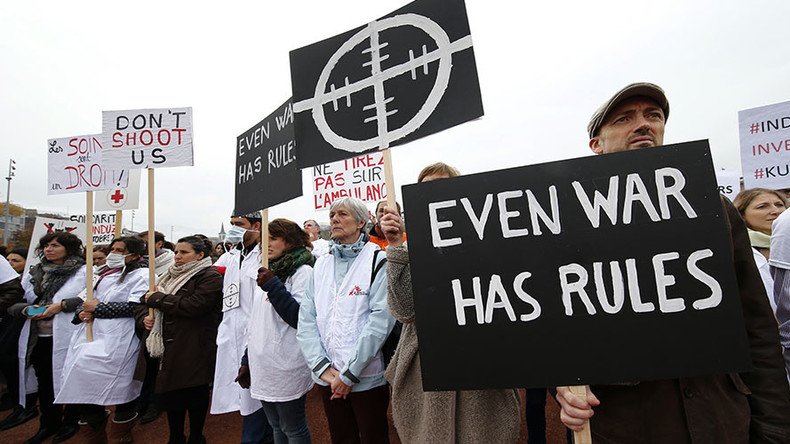‘Disciplined’? Kunduz hospital bombing land ‘mainly administrative’ punishment for 12 US troops

Twelve US military personnel have been issued “administrative punishments” – but no criminal charges – over the bombing of Doctors Without Borders hospital in Kunduz last year, officials revealed to media.
The airstrike by AC-130 gunship took lives of 42, including patients and medical staff.
In October last year, an American AC-130 Spectre gunship had opened fire on the trauma center operated by Doctors Without Borders (MSF) in the city of Kunduz. Preliminary findings done by the charity said the victims – doctors and their patients – were burned to death in their beds, with some others decapitated, shrapnel-wounded or shot from the air while trying to flee.
The gunship made several passes, having fired 211 shells at the compound in 29 minutes before commanders realized the mistake and ordered crew to hold their fire. MSF said their staffers reached NATO HQ in Afghanistan and asked to cease fire immediately, but got zero result.
Phone log of contacts MSF made during US airstrikes on Kunduz hospital. Internal review: https://t.co/An5xB1FflLpic.twitter.com/uX68LxMZri
— Doctors w/o Borders (@MSF_USA) November 25, 2015
On Thursday, US officials told AP on condition of anonymity that the “disciplinary process was nearly complete.” It is derived from a military inquiry into the airstrike and “partially redacted” results of it are expected to be made public in coming days.
The punishments are mainly administrative, according to AP. In some cases the actions, such as letters of reprimand, were “tough enough” to hamper further promotion. But those disciplined reportedly were enlisted personnel and officers, none of them generals.
Back in October, General John F. Campbell, who at that time was in charge of the US and NATO forces in Afghanistan said the strike was “a mistake” and argued that American forces would never target any “protected medical facility.”
US forces in Afghanistan knew Kunduz site was hospital - reporthttp://t.co/0beHTHWcGWpic.twitter.com/uJlOZtDylg
— RT (@RT_com) October 16, 2015
A US military investigation claimed blamed the AC-130 crew for “avoidable human error,” saying they identified the hospital as a target based on visual description from Afghan troops on the ground.
However, cockpit recordings cited in an October NBC report indicate that the gunship’s crew questioned the order and doubted the target was legitimate.
Under the laws of war, military personnel may not comply with superior commanders’ orders if they find them illegitimate or brutal. At the meantime, targeting civilian objects and killing civilians - as well as sick and wounded combatants – amounts to a war crime.
MSF stated in its press release in November that the Kunduz trauma center was not a military objective, nor did it harbor any militants.
“The MSF rules in the hospital were implemented and respected, including the ‘no weapons’ policy … there were no armed combatants within the hospital compound and there was no fighting from or in the direct vicinity of the trauma center before the airstrikes,” the statement said.
“This is the view from inside the hospital. What we lack is the view from outside the hospital - what happened within the military chains of command.”
#Afghan civilian deaths and injuries from 2009 to 2015. https://t.co/d36DpaukWD#CivCaspic.twitter.com/un8Tbuzb5W
— UNAMA News (@UNAMAnews) February 14, 2016
According to the UN’s 2015 Annual Report on Protection of Civilians in Armed Conflict, the total number of civilian casualties recorded in the last year amounted to more than 11,000, including more than 3,500 deaths and almost 7,500 injuries. Last year, there were 3,545 civilian deaths in Afghanistan, up from 2,412 in 2009.











